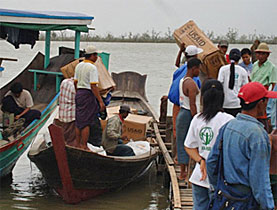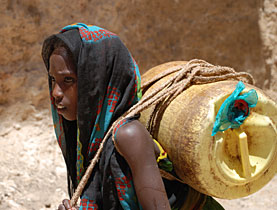Competition among charities harms the cause

The trend for foreign aid organisations to target the Swiss donations market is putting pressure on local charities, a fundraising expert has warned.
Among the world’s highest per capita donors, Swiss residents give some SFr800 million ($737 million) to charity every year, attracting the interest and activity of foreign organisations, Roland Jeanneret of Swiss Solidarity told swissinfo.
Jeanneret is head of communications for the fundraising arm of the Swiss Broadcasting Corporation, which works alongside 35 Swiss partner charities.
He describes the typical Swiss donor as older, more likely to be a woman, with higher education and an open worldview. The end of the year is peak time for donations, when many workers receive a double monthly salary.
swissinfo: More and more organisations are rushing in to get a slice of action in Switzerland. Would it not be more prudent to work together instead of battling against one another?
Roland Jeanneret: The amount of money donated has remained stable for years at between SFr800 and SFr900 million but the number of charities is always increasing. At some point we will have to think about how we can work better together because each charity is generating its own expenses.
The situation is exacerbated by the fact that Switzerland is known as a high per capita donating country. Large foreign aid organisations and the United Nations aid agencies are seeking a share of the lucrative Swiss market. It is particularly worrying that there is no project accountability; they just come to collect money.
Some of these organisations have very large advertising budgets, which puts pressure on local charities to invest more in advertising. That is a bad development. Donors are of course willing to help and give a certain proportion for administration. But they will hardly appreciate contributing to an advertising war in which charities battle for survival.
swissinfo: How can this development be halted?
R.J.: There are two key words to answer this question – cooperation and coordination when working on the same goals. Mergers would also make sense in some cases. But that will not be easy, as so many charities have their own history and tradition and a clearly defined philosophy on how they want to help.
swissinfo: Is the current global financial crisis causing people to save rather than spend?
R.J.: From spring we will start to feel it particularly from institutional donors, because organisations can only distribute money that they have generated. Communes and cantons will feel a drop in tax revenues and companies cannot introduce short time on the one hand and make generous donations on the other hand.
But as these institutional donors only represent ten to 12 per cent of our income, we hope that the financial crisis will not have too strong an effect.
With individual donors we have observed the reverse in times of recession. People show more solidarity and understanding that others are in need and there are also people here who are hit by poverty.
swissinfo: Up to 30 per cent of money collected goes on administration, fundraising and advertising. Is this necessary and proportionate?
R.J.: It is difficult to judge. The best thing is to stick to the definition of the charities certification office [“ZEWO certified”]. It checks how efficiently the aid agencies work. It is also important not to compare apples with oranges. There is a difference between building 300 identical houses in India after an earthquake and counselling 2,000 traumatised children after the tsunami.
Furthermore, not all low-cost aid works well. I could give examples of organisations that wasted tens of thousands of francs because they did not know how to fill in the correct papers for goods to be cleared at customs.
Administrative costs are there to guarantee that the remaining 70 to 80 per cent of the funds is used professionally.
Swiss Solidarity passes on 100 per cent of donations without deductions. Its partner charities can only take out ten per cent for project costs.
swissinfo: Which events get the best response from donors?
R. J.: Events which affect people most generate significantly more donations than something that happens at a remove.
An event can touch people on two levels. The first is the nature of what’s happened, whether there is anyone to blame or whether it is possible to explain the problem. And then there is the geographical aspect: do I know this place, do I have a personal connection to it?
swissinfo: Can you give an example?
R.J.: Take the storms in [the southern] cantons Valais and Ticino in 2000 when the village of Gondo was swallowed by the mountain – a natural disaster. This did not need to be explained to local people. We all knew the threat of the mountain – rockslides, avalanches and landslides. And people knew Gondo as a holiday destination. People were affected on two levels there and the donations reflected that.
But the Darfur conflict stands at a double remove. For years Swiss Solidarity has been collecting for this region but the donations are modest. People do not understand why the people there are persecuting each other and women are being raped. Is the conflict religious, political or cultural or is it about natural resources? And where is Darfur anyway? In Sudan but where is Sudan? Is it in Africa or the Middle East? Neither the place nor the nature of the crisis strikes a chord with people. They are not moved to reach for their wallets.
swissinfo: Does the question of blame also play a role?
R.J.: Yes, in a conflict we quickly have the feeling that it could be stopped at any time, the parties just have to agree. In reality it is much more complex. People are always quicker to help when there is no one to blame – such as with the tsunami or earthquakes.
swissinfo-interview: Gaby Ochsenbein
Swiss Solidarity was set up after the Second World War.
In 1999, the foundation was awarded the International Human Rights Prize for its work.
The organisation is not a charity but a fundraising platform of the Swiss media, led by the Swiss Broadcasting Corporation.
Swiss Solidarity works with 35 partner charities, including the Organisation for the Swiss Abroad.
It supports 300 aid projects in 46 countries.
15 per cent of donations is spent on immediate and emergency aid, 70 per cent on maintaining existing projects and reconstruction, 15 per cent on sustainable development.
There are 1,500 aid organisations and charities in Switzerland.
500 of them have the seal of approval of the certification office for fund-raising organisations.
The amount of money donated by individuals to charitable causes is around SFr800 million.
Swiss residents are relatively generous donators. A record sum – SFr230 milllion – was raised after the 2004 Indian Ocean tsunami, in which 130 Swiss were killed.
Only support ZEWO certified charities.
Do not be persuaded to make donations by telephone.
Every donation entails administrative costs; therefore it is better to make larger donations to fewer charities rather than to support many with small amounts.

In compliance with the JTI standards
More: SWI swissinfo.ch certified by the Journalism Trust Initiative




You can find an overview of ongoing debates with our journalists here. Please join us!
If you want to start a conversation about a topic raised in this article or want to report factual errors, email us at english@swissinfo.ch.